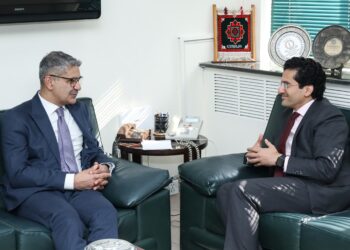ISLAMABAD: Federal Minister for Power, Sardar Awais Ahmed Khan Leghari, has reaffirmed Pakistan’s commitment to strengthening trade and economic ties with Kyrgyzstan, emphasizing that these relations remain a cornerstone of bilateral cooperation.
Speaking at the 5th Session of the Pakistan-Kyrgyzstan Inter-Governmental Commission, Leghari expressed concern over the significant drop in bilateral trade—from $11.2 million in 2022–23 to $5.18 million in 2024–25. He stressed the urgent need to revitalize trade engagement, stating, “We reaffirm our shared aspiration to elevate bilateral trade to USD 100 million.”
He welcomed Baisalov Edil Zholdybaevich, Deputy Chairman of the Cabinet of Ministers of Kyrgyzstan, along with other delegates from both countries, and expressed appreciation for Kyrgyzstan’s continued cooperation toward a more connected and prosperous future.
Highlighting the deep-rooted cultural, historical, and spiritual ties between the two nations, the minister said the partnership has progressed significantly since the formalization of economic relations in 1994. He noted that cooperation has expanded in sectors including trade, investment, tourism, agriculture, energy, science and technology, and education.
To boost trade, Leghari called for consistent collaboration across sectors. He underscored the importance of reviving the Pakistan-Kyrgyz Joint Business Council, increasing business-to-business (B2B) engagement, and finalizing key agreements, such as the Memorandum of Understanding on Electronic Data Interchange between customs authorities.
He praised the inaugural meeting of the Joint Working Group on Trade and Investment and emphasized the need to expedite the Pakistan-Kyrgyz Transit Trade Agreement, a key initiative for enhancing regional connectivity. The recent MoU on Halal trade was also noted as a step forward.
On investment, Leghari highlighted the signing of an MoU between the National Investments Agency of Kyrgyzstan and Pakistan’s Board of Investment. He identified high-potential sectors for investment including textiles, pharmaceuticals, minerals, tourism, and IT.
Pakistan also welcomed Kyrgyzstan’s offer of access to the At-Bashi Logistics Center for Pakistan’s National Logistics Corporation (NLC), calling it a model for future enterprise-level cooperation. He urged both sides to improve the online visibility of investment opportunities, especially details on Special Economic Zones (SEZs), tax incentives, and priority sectors.
Tourism and cultural exchange were described as powerful tools for people-to-people connectivity. The minister looked forward to finalizing the MoU on Tourism, Hospitality, and Investment, and increasing exchanges between tour operators and participation in global exhibitions.
He also noted the significance of a new MoU on agricultural cooperation, which will promote trade in Kyrgyz legumes and Pakistani Basmati rice, among other food products. Enhanced veterinary and phytosanitary collaboration will further ease food trade.
In energy cooperation, Leghari welcomed discussions on Pakistan’s participation in the proposed 500 kV Torugart–XUAR–Gilgit Baltistan transmission line to connect Kyrgyzstan, China, and Pakistan. Kyrgyz interest in investing in Pakistan’s mining sector, especially copper and gold, was also encouraged.
The minister emphasized the importance of strengthening transport and communication infrastructure. He mentioned the anticipated implementation of cargo movement under the 1995 International Motor Transportation Agreement, e-commerce connectivity improvements, and expansion of air and rail links.
Financial cooperation, especially in Islamic banking and fintech, was described as a growth area. He noted a recent agreement between the State Bank of Pakistan and the National Bank of Kyrgyzstan on joint training as a positive step.
On health collaboration, Leghari welcomed Kyrgyz pharmaceutical interest in Pakistani products and potential vaccine production partnerships with the National Institute of Health. He stressed the need for regulatory alignment to streamline medicine registration.
Cultural cooperation and youth engagement were also prioritized, with a call to finalize an agreement on culture and organize joint cultural events. Initiatives like youth policy conferences and exchanges aim to foster future leadership.
Education was described as a cornerstone of the partnership. The minister reaffirmed Pakistan’s support for Kyrgyz students through the Pakistan Technical Assistance Programme (PTAP) and encouraged greater collaboration in STEAM education, academic exchanges, and research.
Ends
Canadian Envoy meets Petroleum Minister
ISLAMABAD : Federal Minister for Petroleum Ali Pervaiz Malik held a meeting with the High Commissioner of Canada to Pakistan,...
Read more













